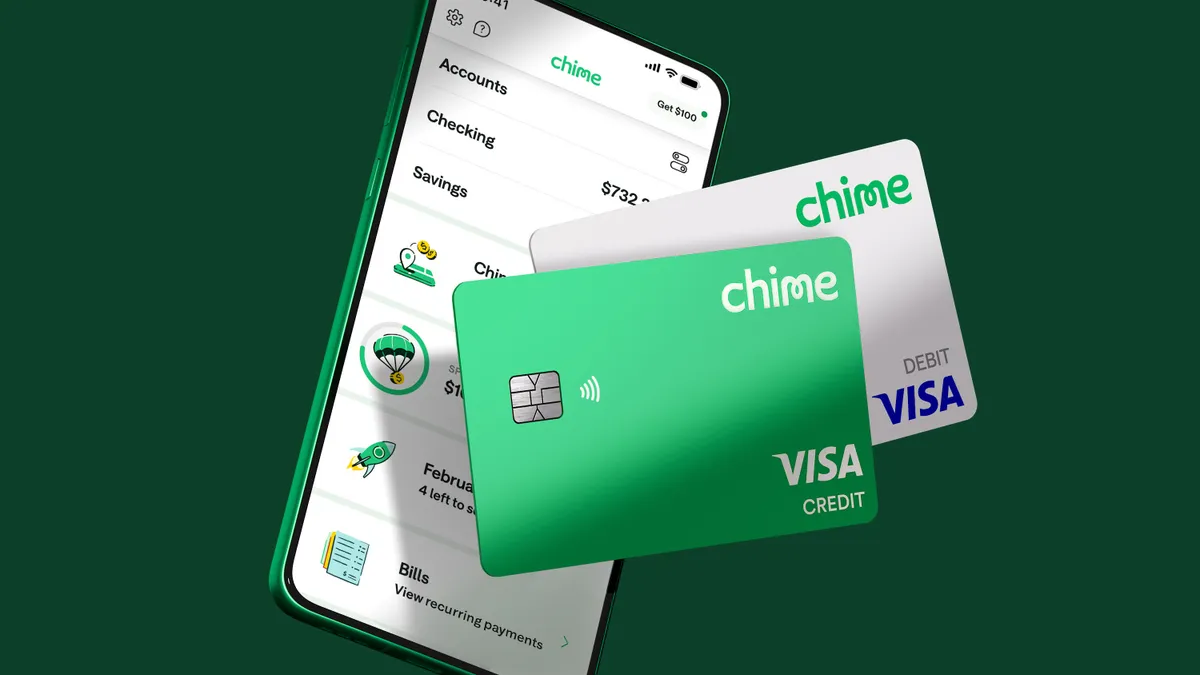Neobank Chime has rolled out instant loans, offering customers access to up to $500 at a fixed interest rate, without having to go through a credit check, the company said.
The product, launched Friday, will offer three-month installment loans to pre-approved Chime customers who use the fintech’s checking account for direct deposits. Chime will tap its technology and data sources to determine loan eligibility, and customers pre-approved for a loan will be notified through the Chime app.
The product “is the latest way Chime is helping to unlock financial progress for everyday Americans,” Madhu Muthukumar, chief product officer at Chime, said via email.
“Early feedback on Instant Loans has been overwhelmingly positive, with extremely high customer satisfaction. We believe this reflects our members’ trust in Chime’s transparent, helpful, and fair financial tools that meet their day-to-day needs,” he added.
Chime has been testing the product for quite some time, and it takes seconds to get a loan, a Chime spokesperson said.
The loan offering carries no fees for origination, prepayment, or late payment but comes with a fixed rate of $5 for every $100 borrowed, which can be paid back in three monthly installments of $35 for each $100 – roughly a 29.76% annual percentage rate. Since loans are disbursed in $100 increments, the minimum amount to apply for is $100, the spokesperson noted.
Customers can opt-in for automated monthly repayments, which have been built to not exceed 10% of monthly cash inflows, the company said. Chime reports on-time payments to credit reporting agencies.
“As members take an Instant Loan, we clearly explain what they are signing up for, and when payments are due — with no hidden costs or compounding interest traps,” Muthukumar said.
Founded in 2012 by Chris Britt and Ryan King, Chime touts itself as a digital banking alternative offering fee-free banking. The firm has around 7 million customers, who use its cards for $8 billion in monthly transactions, Forbes reported. According to a survey by Cornerstone Advisors, half of Chime customers consider the neobank their primary checking account provider. The survey compared this to fintechs like SoFi, MoneyLion, Cash App and Current, which typically see about 25% of their customers treating them as a primary banking or payment solution.
Chime’s instant loan offering follows the neobank’s launch of a suite of products last year. In May, Chime unveiled MyPay, offering early access to up to $500 of customer’s paycheck, including government benefits, without interest, credit checks, or mandatory fees. In August, the firm expanded its SpotMe feature, a fee-free overdraft service Chime launched in 2019. The new integration allows members to access up to $200 in overdraft coverage when using their credit builder Visa credit card. SpotMe surpassed $30 billion in transactions last year, according to the company.
The Bancorp Bank is Chime’s banking partner, providing instant loans. Chime also partners with Stride Bank to offer its other banking products.
Chime has been exploring options for its initial public offering and had tapped Morgan Stanley for the process, Bloomberg reported in September, citing people familiar with the matter. In December, the publication reported the fintech submitted a confidential filing with the U.S. government for its IPO, aiming to go public this year.
Chime declined to comment on its IPO status.
Fintech competitors such as Dave have been eager to offer instant loans to give customers access to convenient financing. Dave promised its customers $500 in 5 minutes or less, a cash advance that customers can receive without credit checks, interest or late fees through its ExtraCash account.
However, the Federal Trade Commission sued the Los Angeles-based firm, claiming Dave allegedly misled consumers and “lured” them to its cash advance application, guaranteeing them up to $500 in loans, which they failed to receive. The FTC also noted that the online platform charged consumers who needed financial assistance with undisclosed fees and “tips” without their consent.














